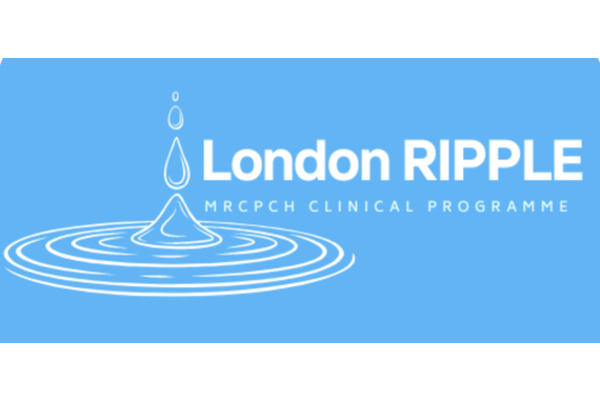The RIPPLE effect: Peer support for acing the MRCPCH Exam, by the London RIPPLE Team
RIPPLE and Paediatrics
The MRCPCH exam is integral to career progression for paediatric doctors in the UK. Though the exam is formatted on day-to-day clinical activities, we often require extra support for preparation in addition to our clinical experience. RIPPLE is a London-based regional teaching program for the MRCPCH clinical exam. It is a 6-week program with daily practice sessions and a mock examination at the end. Paediatric consultants and junior doctors who have completed their membership exam volunteer to facilitate small-group sessions. This initiative is a free resource for trainees. We run the majority of sessions virtually, accommodating for Covid-19 restrictions.
The regular group practice sessions allow candidates to experience exam clinical scenarios and observe and learn from their peers. The mock examinations are timed and are run in strict exam conditions with junior colleagues acting as patients. We regularly update our mock practice and exam questions to closely resemble the most recent exam format. Candidates gain constructive feedback from the examiners as per the RCPCH anchor statements and have the opportunity for self-assessment to help identify strengths and areas needing improvement.
We have increasing number of international medical graduates (IMG) joining our paediatric workforce. There is evidence of differential attainment in exams and career progression within this cohort of doctors. The RIPPLE group offers tailored support to these doctors who are often working in trust grade posts and in need of study partners. The networking, introduction to the exam format and experience of previous IMG candidates help them allay the fear of the unknown, reduce anxiety and contributes to their improved performance. Similarly, we offer individual sessions for those that are resitting the clinical exam and try to deconstruct their exam feedback to see how RIPPLE can help them for their next attempt.
Behind the scenes
The RIPPLE organisers include 5 volunteers who work very hard in the weeks running up to the start of the program. Over the years, exam preparation with the RIPPLE group has proven to be effective and has become increasingly more popular, primarily through word-of-mouth. Once advertised, our 50-candidate registration is booked very quickly. This process was initially via email. The team would filter through the emails and lists of candidates after checking their GMC number and confirmed exam date. The team also reaches out for tutors, and we are very fortunate that those who have previously benefitted from the program promptly volunteer to facilitate sessions. Once a schedule is created, The RIPPLE organisers review all booking email requests and ensure that candidates are booked onto their top 5 sessions of choice along with one mock exam. We felt that if we could streamline and ease this process, it would allow organisers to invest their efforts elsewhere, such as allowing them to create more resources, liaise with more tutors and in addition, offer candidates a more seamless booking process.
The PEdSIG grant allowed us to develop a RIPPLE website to ease booking and scheduling of sessions. Candidates will now be sent a link to sign up and browse through all available sessions. They can filter searches for different stations and personalise their own study plan. We are piloting the booking functionalities of the website with the exam diet in October 2023. Once proven effective, we hope to expand this by building our exam preparation resources through blog posts from previous candidates, Top Tips, recorded videos from our introductory week and link these to our website.
Feedback from candidates is invaluable. We use this to improve our program, and this helps tutors to excel their teaching skills and use the evidence in their portfolio. We appreciate that candidates often find it hard to provide timely feedback within their hectic work and exam schedules. The website will host feedback forms for candidates that will generate immediate tutor feedback at the end of a session. This will facilitate a better response rate and encourage tutors to volunteer and tailor their teaching sessions to be most helpful for candidates.
What have we learnt?
This was a massive opportunity for the RIPPLE organisers to develop their management skills. Previously, this was limited to setting up a regional teaching program and contributing to sessions as tutors. The grant helped us liaise with a scheduling software team from Simplybook.com, understand the technology and build our own schedule. We did test runs amongst ourselves to try and make the website user friendly, incorporating features that would ease the booking process, provide feedback to the RIPPLE team and tutors respectively and have one platform where they can reflect on their preparation journey.
This experience has also prompted us to explore how best we could use innovative technologies to strengthen our program, with discussion around having a framework for AI generated exam preparation models to use in our mock exams. The PedSIG team recognised our hard work and endeavour to support our colleagues. Support from PedSIG allowed us to canvas for more tutor volunteers. Once we establish this website to that envision, we would like to extend our program to help doctors from other deaneries set up their own program locally. Our wish is to build a program that translates into an enjoyable learning experience, peer support and mentoring. The RIPPLE program is an example of an educational innovation and would like to go beyond just acing the exam assessment and highlight that teamwork and peer support complements our journey towards being the ‘paediatricians of the future’.


